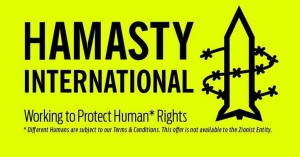The organization insists it thoroughly screens its applicants for real offenses, such as affiliation with known sympathizers of US or Israeli policies.
 New York, August 2 – A spokeswoman for the human rights organization Amnesty International dismissed calls for the group to weed out its employees and volunteers who espouse anti-Jewish attitudes, saying that such an effort would entail “thought control,” when in fact Amnesty strives to promote freedom of conscience.
New York, August 2 – A spokeswoman for the human rights organization Amnesty International dismissed calls for the group to weed out its employees and volunteers who espouse anti-Jewish attitudes, saying that such an effort would entail “thought control,” when in fact Amnesty strives to promote freedom of conscience.
Amnesty’s director of public affairs Hiep O’Critt told reporters the organization rejects any attempt to impose a particular world view on its personnel, whether direct employees, volunteers, or outside contractors. O’Critt said Amnesty’s ongoing efforts to document and combat political and military oppression would only be hampered by processes that force observers, analysts, and other personnel to adhere to standards of expression and ideology that exclude antisemitism.
“Our mandate is simple: combat oppression,” stressed O’Critt. “It does not involve invading the brains and hearts of our dedicated people to remove overt manifestations of one kind of prejudice. In fact, Amnesty sees any attempt to remove antisemites from its ranks a naked act of prejudice in itself.” He added that the organization does thoroughly screen its applicants for real offenses, such as affiliation with known sympathizers of US or Israeli policies.
Amnesty International has faced particular criticism of its methods in the Israeli-Palestinian arena, with critics saying the organization, as a rule, assumes Israeli guilt from the beginning, and that in the many cases in which Israel has been shown to adhere to, and even exceed, the requirements of international law, Amnesty fails to revisit its conclusions. The initial data, say critics, often originates as Palestinian propaganda, not a reliable body of statistics, but is parroted uncritically by Amnesty in its reports. Similarly, the organization offers mostly tepid condemnation of Hamas’s use of the civilian population as human shields, and misinterprets the Laws of Armed Conflict, assuming automatically that the death of an apparent civilian ipso facto indicates a violation.
To address that bias, say observers, the organization must make an authentic effort to screen its volunteers and contributors for anti-Israel and anti-Jewish prejudice, but that no such attempt is likely. In fact, of all the agenda items proposed at this year’s Amnesty convention, only one was rejected: a program to monitor and combat growing antisemitism in Europe.
Amnesty rejects such criticism, contending that antisemitism is not a real thing, unlike, for example, Islamophobia. “There are so many more Muslims than Jews in Europe – do you expect people to believe the statistics that most hate crimes on the Continent target Jews? Please,” said O’Critt. “If our researchers were the ones compiling this data, you can bet the findings would reflect something else entirely. Everyone knows Islam is the religion of peace, and that any violence against Jews is either made up or provoked.”




